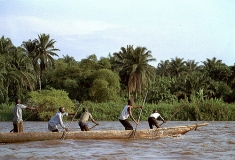The River is Not a Trash Can!
On March 14, 2015, the Coalition of Organizations of the Congolese Civil Society (CORAP) organized an event for the 18th International Day of Action for Rivers with the support of International Rivers. It was a first for the Democratic Republic of Congo, Central Africa, and it enabled people to celebrate rivers, demonstrating that these issues are not only local but global in scope.
This event allowed everyone to realize that it was important to come together around our rivers, in the service of joy, celebration and reflection on best practices to save our rivers from the risks they run – particularly disappearance and pollution.
Civil Society Organizations Visit the Congo River
This visit was important, because the Congo River is an important source of trade, energy, biodiversity, and agriculture for the country, facts that pushed us closer to the river for possible reflection.
Unfortunately, we observed on site that this river is really polluted by plastic waste (bottles, bags, etc.), paper and other waste. Such a state of things worried me very personally, to the point where no one had the courage to even touch this water. But on the other hand, this motivated me to continue with the struggle to raise awareness among the authorities and the general population about the protection of our rivers, seeing as they are the source of life.
In our conversations, participants also shared that this pollution came equally from mining and brewing industries, which both consider rivers to be garbage cans and routinely dump waste in them.
Bitshaku-Tshaku River in a Degraded State!
We also visited the Bitshaku-Tshaku River, located in the Monzindo District, Barumbu town in Kinshasa. A very poorly maintained river, one could imagine the degree of increased unhealthiness in it – and it’s a major source of the Congo River, as several small rivers in the town of Barumbu pour into it. One notable resident of the town named Papa Francis, born in 1928, shared that he personally knew this river and wanted to swim across it at one time because of its depth. But clearly today that depth was filled by an unprecedented amount of trash, characterized by all forms of waste (household waste, bottles, bags, paper, etc.).
We can say that water is life, but it can also be a source of death because of pollution that may promote contamination (water-borne diseases), floods and other things.
The DRC has important freshwater resources, but these resources are not accompanied by good management. Only 23% of people nationally have easy access to potable drinking water.
Therefore, as an agent of development, I think it’s important that each Congolese person understand that rivers are not trash cans and also become aware of his or her responsibility to respect and protect our rivers, to finally bring the desired change – because rivers unite us and give us food to eat and water to drink.




